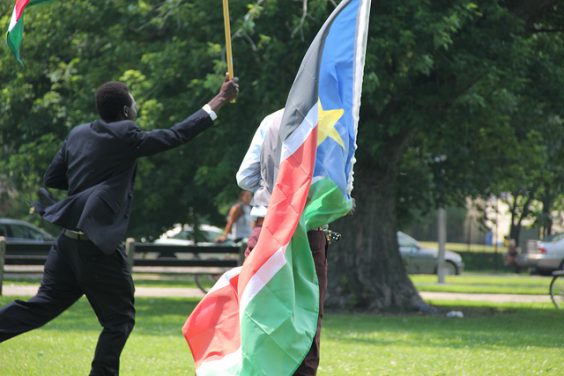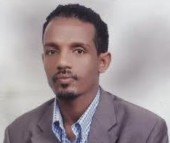South Sudan is Back to Square One
by Chalachew Tadesse / August 5, 2016 / No comments

Independence celebrations in South Sudan. The country has been free for five years, but conditions for journalists continue to deteriorate. Image via Flickr user: Daniel X. O’Neil.
Once dubbed a “promising nation” after its independence in 2011, South Sudan is becoming an increasingly more violent environment for journalists.
When speaking of South Sudan, one thing is always certain: if there is a very risky job in the youngest African country, it is journalism. Overlooking the tense political atmosphere, several courageous journalists have embraced the newly-found freedom of press from its onset. So, the immediate aftermath of independence has seen mushrooming of vibrant publications and radio stations. The media laws that guarantee freedom of expression, which came into effect in 2014, were reason enough for celebrations. It wasn’t meant to be, though, for the euphoria was short-lived. With the killing of seven journalists in the year 2015 alone, the Committee to Protect Journalists (CPJ) has dubbed South Sudan “the most dangerous place in Africa to practice journalism.”
A few months after the two-year long civil war that lasted from 2013 to 2015, renewed violence ravaged the country again in July. This came after the rebel leader and former Vice President returned to the capital, Juba, following a mediated peace agreement that ended war and put in place a transitional unity government. Two months after the rebel leader assumed his former position, a “tricky incident” led to a bloody battle between the rival armed forces loyal to President Salva Kiir and his Vice First President Reik Machar. Well accustomed to rebellion as he is, Machar immediately slipped into the bushes once again, thereby jeopardizing the very peace deal that put an end to the senseless violence. Despite accusations and counter-accusations, the guns have now been silenced following international condemnation against the duo.

- This column’s topics will include literature, art, education, history, and political culture in Ethiopia, as well as society and politics in the Horn of Africa. Moreover, I will address the tribulations of journalists and the ill-fated constitutional right of freedom of expression under Ethiopia’s deceptive authoritarian regime. I will try to be the voice of the voiceless, be it persecuted journalists at home or exiled journalists abroad. These themes will make Ethiopia’s uniqueness and absurdities evident.

- Chalachew Tadesse is an Ethiopian journalist and columnist. He has previously worked as a full time journalist for The Reporter and The Sub-Saharan Informer English newspapers. He was also a columnist for the much-acclaimed Fact magazine, before the Ethiopian regime closed it in October 2014. A political science student by training, he works as a university lecturer and is known for his sociopolitical commentaries on the Ethiopian private press.
In South Sudan there is more to the mere story of the killing of journalists. The violence is being waged along tribal lines. Tribal identity is also an added reason to justify the killing of journalists. Most recently, more than 200 people have died after a week-long period of fighting. John Gatluak, a correspondent for the American-based Internews, was the latest victim in a series of journalist killings. Gatluak was gunned down by unidentified armed men because of his ethnicity. The deceased is from the ethnic Nuer, the same ethnicity as the beleaguered, disgruntled, and embattled Machar. Mind you, tribal identifications are quite easy in South Sudan. Most individuals have traditional unique marks on their foreheads.
Since the 2013 violence, the government targeted several beleaguered journalists who have since faced frequent menace to their work. Alas, not even the President shies away from publicly making threats. Disgruntled as he was during the two-year long civil war, in August 2015 Kiir threatened to kill journalists should they “work against the country.”
Undoubtedly, his actions have proved that the President indeed meant what he said. Harassment, arbitrary detention, and confiscation of independent publications have been frequent. Most recently the authorities arrested Alfred Taban, editor-in-chief of the independent English-language daily Juba Monitor, without charge. Subsequently, they forced the publication to quit citing contents that could not please the embattled government of President Kiir. Following the onset of the war, the president has, time and again, accused several journalists of backing the rebel leader. Amid the latest flare-up of violence, Taban, who was later released from the first detention, was recently arrested again for calling upon both rival politicians to resign. While still facing charges, the veteran journalist was again released on bail in early August.
In December of last year the authorities also arrested Joseph Afandi, an editor for the month-old Arabic daily El Tabeer (“Expression”), for criticizing the way the incumbent government handled peace negotiations. What is more, the government’s National Security Service verbally ordered the immediate shutdown of El Tabeer. Following two months of detention incommunicado, Afandi was released in February only to face kidnapping and severe torture in early March by unidentified armed militia.
Radio stations aren’t spared either. Free Voice radio was shunned indefinitely. The English daily, The Citizen, also has remained closed since August 2015 after being accused of helping the armed opposition group led by vice president Reick Machar. The country’s emerging promising media, which could help could help build democracy in the war-torn and poor country, has been shaken to the core by heavy-handed actions of Kiir’s government.
Human rights defenders allege that in the first three months of 2016 alone at least six journalists and human rights defenders were arbitrarily detained. Some have been subjected to torture and degrading treatment. International condemnations against the failings of the government are common. No matter the scale of the tribal violence, the blatant and frequent arbitrary arrests, closure of publications, and extrajudicial killings of journalists have not been entirely overshadowed. Yes, the world is watching how Kiir’s government is handling freedom of expression and the press.
The authorities are using tribal violence as a disguise to do whatever is necessary to threaten the survival of critical media. Two issues are sensitive in South Sudan: tribal-based sinister internal power struggles within the government, and corruption. Yes, journalists have a lot to report about in a country where tribalism lies at the bedrock of its politics and economy. Diversion of huge sums of money from government coffers by army commanders and top officials for personal enrichment is routine. South Sudan ranks 163rd out of 168 countries in the Transparency International Corruption Index. Unfortunately, journalists who have been critical of the authorities on these counts have been subjected to unspeakable ordeals and even death.
Given the newness of the country, it is undeniably true that freedom of expression hasn’t yet taken root. Young as it is, just like the country, some of the emerging media outlets may not be wholly independent and professional. No matter what, though, senseless reprisal killings and witch-hunts against journalists are no solution. Nothing comes out of this except dragging the country back to the very dark days from which it has just emerged.
A more disturbing development in the country is the fact that no one has ever been brought to justice for the callous crimes committed against journalists. In as much as transgressions against the press have become routine day-to-day occurrences, so has impunity. The fact that the government embraces impunity for perpetrators of crimes is undoubtedly a worrying development not only for the emerging media, but for the young country’s democracy and peace as well. Today, South Sudan has “the worst impunity offender index” in Africa, only surpassed by Somalia, and it stands fifth in the world. The 2014 African Union human rights inquiry had determined that crimes against humanity and war crimes were committed by all parties and recommended a court to “bring those with the greatest responsibility at the highest level to account.” No positive step has been taken to date to ensure this, though. Peace is a luxury for ordinary South Sudanese. So is justice.
Literally speaking, South Sudan is passing “from crisis through crisis to crises” since its independence from the Arab-dominated Sudan in 2011. It seems the young country was born to fail, so to speak. Once dubbed a “promising nation,” its state of affairs soon turned out to be worrying in all respects. A ceasefire that seems to be held today could easily explode into violence in a blink of an eye. Yes, the ceasefire has been short-lived, as the two parties have resumed skirmishes in the past few days following the president’s decision to sack Machar again and replace him with his former ally in violation of the peace deal. Nothing can be guaranteed, except, perhaps, that violence is always at everyone’s doorstep. In my view, for the silence of the gun to endure, the international community must punish both rivals with targeted severe sanctions.
One more solution: one of them or both must resign from politics unconditionally so that the ordeal of the ordinary South Sudanese can end. It’s no doubt that South Sudan’s main menace now is the personal hostility between the two former comrades-in-arms. They have proved to the world that they can’t coexist anymore. The country needs a leadership that can bury the past and chart a brand new future where a vibrant press could play a pivotal role in the country’s democracy and development. Building a war-torn country and inculcating democratic values and tolerance in a post-liberation period is an arduous task. In the absence of critical press, this complex project becomes unarguably more arduous.
One more solution: one of them or both must resign from politics unconditionally so that the ordeal of the ordinary South Sudanese can end. No doubt that South Sudan’s main menace now is the personal hostility between the two former comrades-in-arms. Without a doubt they have now proved to the world that they can’t coexist anymore. The country now needs a leadership that can bury the past and chart a brand new future where a vibrant press could play a pivotal role in the country’s democracy and development. Building a war-torn country and inculcating democratic values and tolerance in a post-liberation period is an arduous task. In the absence of critical press, this complex project becomes unarguably more arduous.




